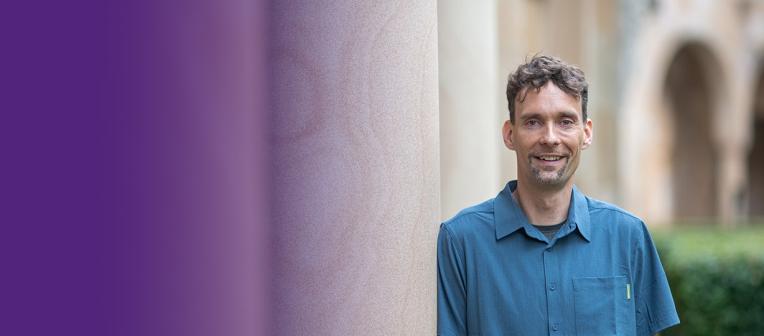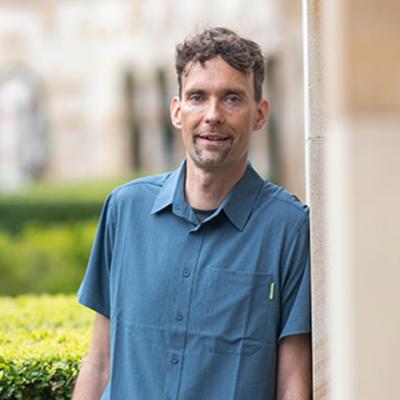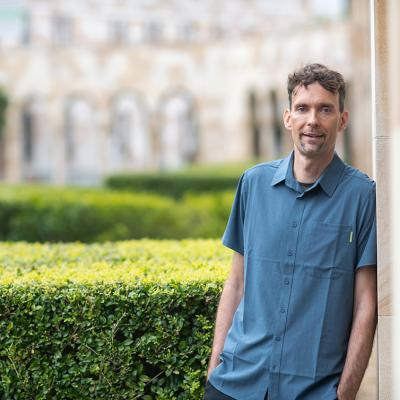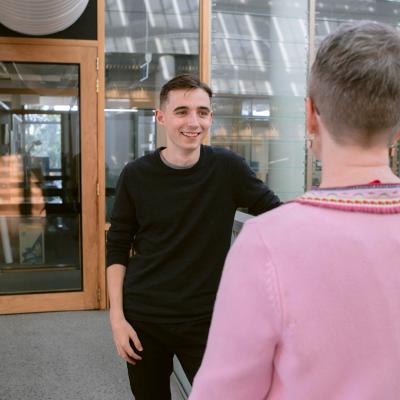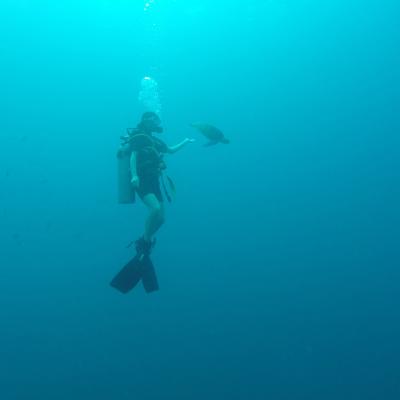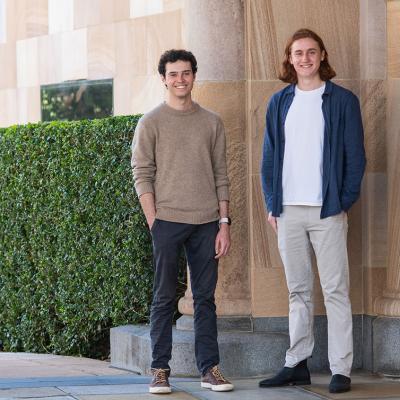Could insects and microbes hold the solution to the world’s plastic waste crisis? They just might – especially with people like Senior Lecturer Dr Chris Rinke researching them.
Chris is one of the brains behind the recent breakthrough involving superworms digesting polystyrene. But, believe it or not, this is only one aspect of his research.
From bacteria in Brisbane’s ‘Brown Snake’ river to microbial ‘dark matter’, Chris is fascinated by how the smallest organisms play one of the largest roles in Earth’s history.
And he loves sharing this fascination with his students.
If this video isn't available in your region, you can watch using Brightcove.
What brought Chris to UQ?
Chris’s academic journey began in Vienna, where he completed undergraduate and postgraduate degrees in general biology and zoology. At the beginning of his PhD, a new professor started offering microbial ecology as a field of research – inadvertently setting Chris on a whole new path.
“I actually shifted a little bit from the animal I was studying more to the microbes,” says Chris.
This led him to postdoc positions at the Washington State University and the US Department of Energy Joint Genome Institute, where he learnt about new techniques in the field, published research in high-profile journals and became even more interested in the intriguing world of microbial genomics.
The next stop for Chris was Brisbane, but he didn’t travel by plane.
“My wife and I pursued a personal goal and set out to successfully cross the Pacific Ocean on an old sailboat we had fixed up on weekends,” he says.
“Eventually, we landed in Queensland, and my microbiology skills secured me a position at the best university in the state – first as a research officer, and now as senior lecturer.”
What Chris loves about teaching
Genuine excitement for his subjects is what makes Chris such an inspiring teacher. But it’s the excitement of his students that makes it rewarding for him.
“I think my favourite thing about teaching is that students learn new pieces of knowledge and they get really excited about this – something they didn’t know – and then they want to dig deeper and learn more about it,” he says.
“I think that’s something very rewarding, actually, I really like that a lot.”
Chris also acknowledges that microbiology – and science more generally – comes with its fair share of obstacles and challenges. But this is just another factor that keeps him coming back to both the lab and the classroom.
“Science is exciting, but science can also be hard sometimes,” he says.
“You have to repeat an experiment a few times, and that happens in my lab as well.”
“When a student actually manages to learn why an experiment is not working and then modifies the experiment a little bit, and then it all of a sudden gives the result that you expect… I think that is very rewarding.”
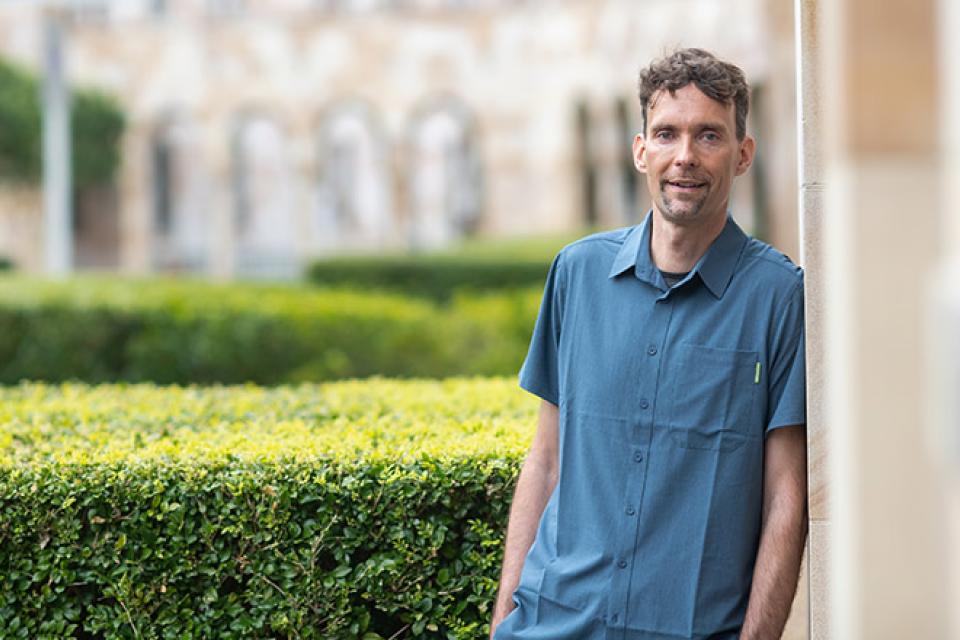
Chris’s favourite courses to teach
Teachers, like parents, aren’t supposed to choose favourites. But Chris has a soft spot for lecturing to students about the impact microbes have had on Earth’s history.
“One lecture I like a lot is talking about the origin of life on Earth,” he says.
“I was always fascinated by the power that microorganisms have – they are the reason why plants, animals and humans can live on Earth. For example, about 2 billion years ago, a group of bacteria called cyanobacteria figured out how to use sunlight and carbon dioxide to create energy and oxygen, and that’s why we now have 21% oxygen in the atmosphere and why humans can breathe on Earth.”
Microbial genomics is another favourite subject for Chris.
“We explore powerful bioinformatic methods to recover encoded enzymes and pathways from uncultured microbes, known as microbial dark matter,” he says.
“This is a very new, emerging and promising field. It’s good as a student to have this knowledge, this ability to apply bioinformatics by using computational methods to analyse complex biological data.”
“Microbial dark matter”? Please explain.
You may already know about “dark matter”, the astrophysics terms for all the mysterious matter that’s out there in the universe and is difficult to detect.
Microbial dark matter is much the same. It’s all the microbes that we don’t know much about because scientists haven’t been able to study them – yet.
“There’s a great variety of microbes out there, but we don’t have much information about them because microbiologists traditionally get those microbes, culture them in the lab, and then study them – and we can’t really do that with the majority of microbes,” says Chris.
“In recent years, my lab and others have developed methods so we can actually target this microbial dark matter and learn from it. One of those techniques is metagenomics, which we also used for the superworm study.”
Chris’s motivation as a researcher
Chris considers himself fortunate to be both a senior lecturer and active researcher.
“I think I’m lucky as a researcher, because we discover new things that nobody has ever seen before,” he says.
“Several times a month, we have something that nobody else has seen or researched before – it’s very rewarding.”
But it’s not all about the discoveries for Chris. He’s also driven by the opportunity to put his findings into action and make an impact on the world.
“If you think about applied science, there’s also the aspect that what you find in your laboratory can eventually be used for a greater good,” he says.
“So, there is this potential there – that’s also very motivating.”
“Everybody wants to contribute to live on a safe and clean planet, and I think as a scientist – as a microbiologist – we can do our part to achieve that.”
Chris isn’t the only person who benefits from his dual teacher/researcher role, either. His students also reap the rewards of being taught by someone who is actively researching in the field.
“I would say that the methods we use are really cutting-edge, so I think that’s good if you’re going to continue in academia and industry,” says Chris.
“If you really know about the methods and actually know how to apply the methods that are state-of-the-art currently, I think that's very good – especially bioinformatics. You can stay in academia, or there are also several options to go into private industry with the knowledge that you gain.”
Chris’s message for future students
To put it simply, if you’re interested in microbiology and how it can be harnessed to help the world, Chris would love to teach you. And he would encourage anyone with a curious mind to consider studying science at UQ.
“I think there are a lot of solutions to our problems out there in nature, but we have to understand how nature works, we have to learn from it, and we have to then implement that,” he says.
“And understanding science and biology – and microbiology – is very helpful to achieve that goal.”
Explore all the UQ programs that could help you create change, or meet some other UQ academics who are impacting the world in their own fields and their own unique ways.

